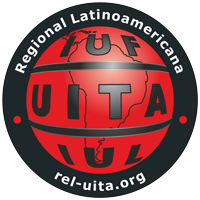
“A dream that is dreamt alone is just a dream that is dreamt alone.
But a dream that is dreamt together is reality”
(Preludio, Raúl Seixas)
With a different perspective from that of many of the participants that usually attend these events organized by Clamu, Valeria narrated her personal experience as both the mother and former wife of LGBTI people.
Speaking in a warm Bahian accent and unhurried voice, she captivated the more than forty people attending the Round Table, who listened raptly to her story of growth.
Valeria began by singing the above verse from a song by Raúl Seixas, as an analogy of her reality as activist and mother of an LGBTI son.
“I believed myself to be a completely deconstructed, open educator, until I learned that my youngest son was gay,” she said.
She remembers how for at least a year and a half she felt a rejection toward her son that prevented her from showing him any sort of affection.
“I was an evangelical, and in that religion homosexuality is a sin, it is considered unnatural, and I had all those prejudices, even though I thought I didn’t,” she notes.
“One day we were watching TV and my son, who was 14 at the time, asked me when I had decided to be straight. I reacted angrily. ‘Are you stupid?,’ I said. ‘I didn’t decide to be straight, I was born that way.’ My son then went off to his room chanting: ‘She didn’t choose to be hetero, she was born hetero,’ and at that moment I realized what I had done.”
Valeria described how she cried and cried that night, how she felt a lot of guilt, and how she was unable to talk with her son until the next morning.
“Homosexuality is not a decision; we don’t wake up one day and decide ‘today I’m going to turn gay.’ It’s a state of being,” she reflects.
After that moment and upon suggestion of her son, she reached out to the group Mothers for Diversity.
She joined them, but when she noticed certain limitations imposed by the group, she decided to break away and form Families for Diversity with some other people. This group currently supports, counsels, and offers a space to any LGBTI individuals who for whatever reason are forced to leave their homes.
The group helps manage the temporary home “Casa Aurora,” where LGBTI persons who have been driven out by their families can stay for up to six months, a period limited by the size of the facilities, which can only house eleven people at a time. There they are not only given a place to live, they also receive medical and psychological care, as well as training courses so they can learn a trade and find employment.
“This project was an initiative of the Diversity and Inclusion Association of Bahía, in which we participated,” Valeria explains, adding that it is “a very important space, because many LGBTI people have an extremely difficult time facing their families or getting them to accept them.”
“The focus of our group is on supporting families and we try to help the individual return to their home. We don’t always succeed, but that’s what we aim for,” she said.
Valeria told her story so eloquently that time just flew by, so nobody noticed that her presentation had continued into the slot reserved for questions from the audience, and there was less time for that.
But more than ask her questions, what participants wanted was to thank her and share their own personal experiences. As usual, the two hours of the event were not nearly enough for all there was to talk about and share.
I am convinced, however, that we came out of this new virtual meeting with a broader understanding of values such as respect and empathy, and above all of what we have yet to learn, or perhaps unlearn, and with an awareness of certain discriminatory behaviors entrenched in society.
I am also convinced that we are on the right track.
